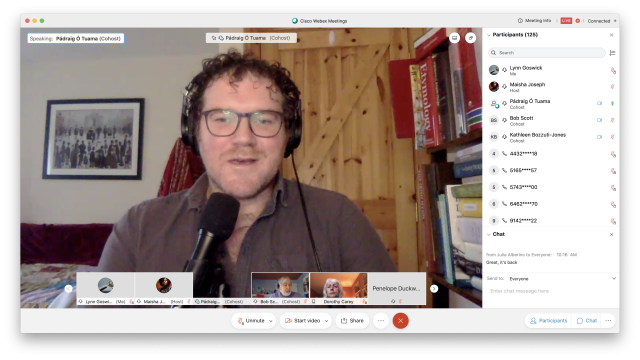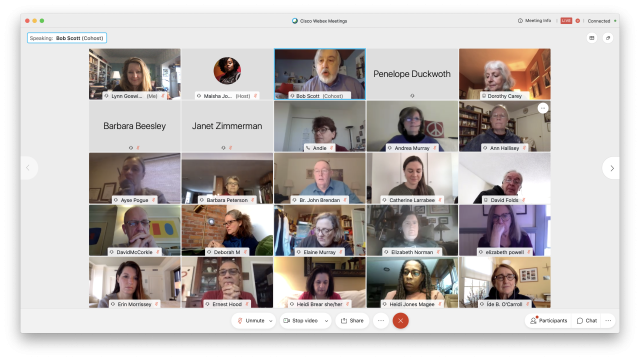Neighbors Without Borders
Pádraig Ó Tuama notes that when he thinks about the term social justice, he concentrates on “social.” And it is through that lens that he presented an online retreat, titled “Social (In)Justice," for Trinity Church Wall Street on Halloween.
“The word social comes from an old Latin word meaning friend. Often, we want justice for our friends, but we stop there,” Ó Tuama explained.
“In imagining an expanded — and ever expanding — approach towards ‘Who is my friend?’ we consider how justice could be reframed through the lens of friendship — in poetry, scripture, spirituality, and in public.”
Pádraig Ó Tuama is an author, a poet, and a public theologian in Ireland. He served for many years as leader of Corrymeela, a community founded to promote reconciliation among individuals and communities that have been immersed in conflict, originally focused on British-Irish sectarianism and eventually growing its outreach to include conflicts all over the world. His Bible studies invite readers to notice the “small words” in scripture and to imagine what’s going through the minds of marginal characters who are interacting with Jesus.
Ó Tuama began with the scripture commonly called the Parable of the Good Samaritan (Luke 10: 25-37). However, instead of emphasizing the many acts of kindness performed by the Samaritan to the robbed and beaten traveler, Ó Tuama asked participants to concentrate on the words of the lawyer whose question leads to the parable: And who is my neighbor?
“Often this is the question we’re really looking to answer: Who am I allowed to hate? Who can I put in the enemy category? When can I justify saying: 'I control you, I don’t have to listen to you?’
“Rarely does hate present itself as hate. But the hate we curate says an enormous amount about who do we need to give justice to, and who we do not.”
Kathy Bozzuti-Jones, Associate Director of Faith Formation and Education at Trinity, found Ó Tuama’s perspective on this familiar scripture especially challenging.
“In my studies, I’d come to understand the answer to the [lawyer’s] question as ‘the one who shows mercy.’ Framed as a question about justifying hatred, about how societies justify cruelty to some groups and enshrine it in social structures, however, Jesus’ response seems even more radical: Everyone — with no exceptions, no exclusions, no hatred, no othering, no justification for disdain, no scapegoating, no ideas of inferiority or superiority — is neighbor.
“Pádraig has a way of putting his finger on how injustice wounds, calling folks to think hard about their complicity.”
Another scripture used during the retreat comes from Mark 5:24-34, the story of the woman suffering from a hemorrhage for 12 years. Pádraig Ó Tuama first introduced the poem “An Issue” by Katie Manning then asked retreat participants to concentrate on the words: She had endured much under many physicians, and had spent all that she had; and she was no better, but rather grew worse.
Although the text includes a question from Jesus asking who in the large crowd had touched him, Ó Tuama suggests we see Jesus’ attention to the newly-healed woman differently.
“I think Jesus was most interested in who had kept the woman hidden.”
Originally planned as a “core values” retreat focusing on social justice, and as a live event at Trinity's retreat center in West Cornwall, CT, the gathering became virtual due to the novel coronavirus pandemic.
Ó Tuama commented on other topics during the retreat.
* Acknowledgements of the land of indigenous people: “Doing a land acknowledgment is not enough, you must call for treaty and reparation. Land acknowledgments are only a way to raise the call to justice.”
* White privilege: “We [white people] can recognize disproportionate suffering. You will have opportunities, even if you're poor, that others who don't look like you will not have.”
* Settler colonialism: “How do we begin to tell genocidal stories?”
“I particularly welcomed Pádraig's way of creating such an incredibly spacious welcome,” said Trinity parishioner John Deuel. “That various views of scriptural authority were explicitly acknowledged highlight the openness that characterized the whole experience for me. I loved the poetry sharing, and the attentiveness that Pádraig gave to everyone's comments in the chat.”
Perhaps reflecting his many years of work with communities in conflict, Pádraig Ó Tuama offered a view of the future that is candid, yet ultimately hopeful.
“The day after peace will be filled with disagreement. What does justice look like? It looks like argument, but argument without threat, and where there is an equitable standard for access to opportunities, and where we are not afraid to name the fact that our lives and life experiences have been disproportionate.”
Pádraig Ó Tuama presents Poetry Unbound from the On Being Studios. You can find this immersive, unhurried offering wherever you get your podcasts.

